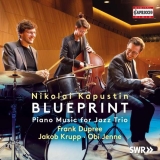Nach seiner CD mit Orchesterwerken von Nikolai Kapustin (1937-2020) wendet sich Frank Dupree den Klavierwerken des Komponisten zu, die vom Jazz beeinflusst wurden. Im Textheft sagt der Pianist: « Nikolai Kapustin komponiert Jazz, quasi ausnotierte Improvisation, inspiriert von sämtlichen Jazz-Richtungen. Man könnte sagen, er paust den Improvisationsstil unterschiedlichster Jazz-Pianisten ab, perfektioniert diese und verarbeitet die Jazz-Elemente in klassischer Form. » Und so wurden diese Klavierstücke auch von vielen Pianisten gespielt. Dupree aber macht mehr mit dieser Musik. Er führt sie eigentlich in entgegengesetzter Richtung in den Bereich zurück, wo sie herkommt, indem er mit seinem Trio dem Klavier Bass und Schlagwerk hinzufügt.
So entstand ein ganz spezielles Album, das klingt, als ob es sich um Jazz-Standards handelt, die in einem intimen, kleinen Club aufgeführt werden. Die Atmosphäre ist angenehm und die Musik ist, nun ja, Jazz. Oder doch nicht? Die Verbindung zur Klassik lässt sich eigentlich nicht leugnen.
Dupree spielt auf eine Art und Weise, die sowohl elegant als auch geschmackvoll ist. Dem Trio gelingt es, den klassischen Puls neu zu beleben, der sich im Herzen dieser Musik verbirgt.
Die Idee dieser CD ist auf jeden Fall begrüßenswert und sehr ehrgeizig, zumal es das Trio geschafft hat, die Kompositionen mit vielen Farben und Stimmungen in einem sehr persönlichen Stil abzuliefern, mit großer Liebe für das ursprüngliche Material und einer Ernsthaftigkeit des Anliegens, die von profunder Musikalität zeugt.
After his CD of orchestral works by Nikolai Kapustin (1937-2020), Frank Dupree turns to the composer’s piano works influenced by jazz. In the booklet the pianist says: « Nikolai Kapustin composes jazz, in a way he notates improvisation that’s inspired by all types of different styles of jazz. You might say he creates blueprints of the improvisatory style of the most famous jazz pianists, perfects them, and employs these jazz elements in classical forms. » And so these piano pieces have been played by many pianists. Dupree, however, does more with this music. He actually takes it in the opposite direction back to where it came from by adding bass and percussion to the piano with his trio.
The result is a very special album that sounds as if it were jazz standards performed in an intimate, small club. The atmosphere is pleasant and the music is, well, jazz. Or not? There’s really no denying the connection to classical music.
Dupree plays in a way that is both elegant and tasteful. The trio ultimately succeeds in reviving the classical pulse that lies at the heart of this music.
The idea of this CD is definitely welcome and very ambitious, especially since the trio has managed to deliver the compositions with many colors and moods in a very personal style, with great love for the original material and a seriousness of purpose that testifies to profound musicality.






















